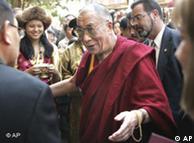时事风云 | 2007.10.17
同是会达赖,布什比默克尔更“够朋友”?
美国总统布什在白宫会晤了达赖喇嘛,并将出席美国国会今天为达赖颁发国会金质奖章的仪式。达赖喇嘛表现得最为轻松。就中国方面对布什在白宫与他会晤表示的 愤怒,达赖喇嘛笑着说,每次都这样。白宫方面却无法轻轻松松地平息中方的怒火。除了强调布什与达赖的会晤纯属私人性质以外,双方在会晤后既没有公布照片也 没有发表声明。
布什虽然是在白宫会见了达赖,但会晤地点是在其白宫住处的“黄色椭圆形厅”,远离正式会晤场所椭圆形办公室。白宫发言人佩瑞罗说:“我们不想再对中国人火上浇油。”
即便如此,中国对达赖喇嘛在华盛顿受到的高规格礼遇已经非常气愤。除了被邀请到白宫与布什会晤外,这位西藏流亡精神领袖还将获得美国国会颁发的最高 奖国会金质奖章。曾经荣获美国国会金质奖章的包括前南非总统曼德拉,已故教皇约翰保罗二世,歌星南希.辛纳特拉,修女特雷萨等等。
颁奖仪式将在当地时间周三下午5时举行,布什也将到场,并将作简短发言,之后亲手将奖章颁发给达赖。这将是首次有美国总统在公开场合与达赖喇嘛共同 亮相。佩瑞罗说:“布什知道,此举会引起不一致的看法。但是,作为美国总统,他总是在颁发国会金质奖章时在场,所以这一次他也将出席。”
中国方面对美国礼遇达赖表示愤慨。中共西藏党委书记张庆黎说,我们很愤怒,如果达赖都能获得这个奖,那么这个世界上就没有公正和好人了。中国外长杨 洁篪先前要求美国取消布什与达赖会面的安排,说布什会见达赖是一次“错误的行动”。中国外交部发言人刘建超说,如果美国不更正有关达赖的安排,中美双边关 系会受到严重影响。”
布鲁金斯学院的中国问题专家李成并不认为达赖获得美国国会最高奖会对中美关系造成长期影响。他说,北京领导人知道达赖喇嘛几十年来在美国享有很高声望。北京只是对达赖访问的时间感到不满:“现在正值中共十七大召开之际。北京认为媒体应该更多地报道中国的进步。”
李成认为,布什事先就告知中国他将会晤达赖,这对事态是有帮助的。而默克尔在会晤达赖之前并没有这样做。中国人认为这是不够坦诚,不够朋友,缺乏信任的表现。因此北京迄今仍然对德国耿耿于怀,并且取消了一个又一个官方会谈。
为什么中国人对德国做出的反应远远比对美国要激烈,李成的同事,布鲁金斯学院的理查德.布什还有另一个解释:“如果跨越了现有的界限,中国人就会很生气。德国总理默克尔在总理府会见达赖便是如此。因此北京的反应会如此激烈。”
中国方面不愿看到其他欧洲国家或政府首脑效仿默克尔,与达赖会晤,并且以此提升达赖的政治地位。不过,理查德.布什安慰说,长期而言,北京既不愿失去美国,也不愿失去德国。因为经济关系太重要了。
With One Eye on China, Bush Receives Dalai Lama
WASHINGTON, Oct. 16 — President Bush met privately with the Dalai Lama at the White House on Tuesday, as tensions escalated between the United States and China over Congress’s awarding its highest civilian honor to the exiled Tibetan spiritual leader.

The Dalai Lama returned to his hotel in Washington on Tuesday after a visit with President Bush at the White House. When asked by reporters about the Chinese, he threw up his hands.
Multimedia
The 30-minute meeting, which the Dalai Lama said included a discussion of the situations in Tibet and Myanmar, formerly Burma, was fraught with symbolism and cloaked in secrecy — an effort by the White House to avoid further angering the Chinese.
The session was held upstairs in the Yellow Oval Room of the White House residence, not the Oval Office, to send a message that Mr. Bush was receiving a spiritual leader, not a political one.
Aides to Mr. Bush declined to disclose details of the discussion, and the White House would not release a photograph of the two together, as it has during previous visits.
“We in no way want to stir the pot and make China feel that we are poking a stick in their eye,” Dana Perino, the White House press secretary, told reporters, adding, “We understand the Chinese have very strong feelings about this.”
The Dalai Lama, a Nobel laureate, has lived in exile in India since the Chinese army crushed an uprising in his homeland in 1959, and is revered as the spiritual leader of Tibetan Buddhists. He has been pressing, without success, to return to China to advocate for greater cultural and religious freedoms for his followers.
The Dalai Lama’s envoy, Lodi Gyari, who attended the meeting, said Mr. Bush described his efforts with China’s president, Hu Jintao, on the Dalai Lama’s behalf: “The president said he has been telling the Chinese president that you need to meet with this man, you should trust the Dalai Lama, I know this man and I trust him and you must not hesitate to meet with his holiness.”
At the end of the meeting, Mr. Gyari said, the Dalai Lama closed his eyes, as if in prayer, and then offered gifts to the president and first lady: white silk ceremonial shawls, which he draped around each of their necks.
The Dalai Lama is in Washington for a week of festivities. On Wednesday, he will receive the Congressional Gold Medal in a ceremony at the Capitol, and will later deliver a speech on the Capitol lawn. Mr. Bush will participate in the award ceremony, marking the first time he and the Dalai Lama will have appeared together in public during this visit.
That has infuriated the Chinese, who on Tuesday warned the United States not to honor the Dalai Lama, saying it would have “an extremely serious impact” on relations between the United States and China.
Speaking at a Foreign Ministry briefing and on the sidelines of the 17th National Congress of the Communist Party, the Communist Party boss of Tibet, Zhang Qingli, condemned the Dalai Lama as a “splittist” who wants to break Tibet away from China.
“Such a person who basely splits his motherland and doesn’t even love his motherland has been welcomed by some countries and has even been receiving this or that award,” Mr. Zhang said, adding, “We are furious.”
But the officials did not say what actions the Chinese would take. A senior White House official, speaking on condition of anonymity to avoid further straining relations, said the award was unlikely to seriously disrupt China’s relations with the United States, which have warmed as the countries have cooperated on an agreement to end North Korea’s nuclear program.
“They know where we stand on the Dalai Lama and religious freedom, and we know where they stand,” the official said. “So we can all make these statements, but we wind up in the same place at the end of the day.”
Still, by participating in the ceremony, Mr. Bush will be walking a fine line. He began laying the groundwork to soothe Chinese feelings more than a month ago, in Sydney, where he told President Hu that he would attend the Congressional medal ceremony — at the same time that he accepted an invitation to attend the 2008 summer Olympics in Beijing.
Mr. Bush cannot afford to alienate Mr. Hu; he wants China to help end Iran’s nuclear program, as it has done with North Korea.
But on Monday, the Chinese postponed a meeting in Berlin at which world powers were to discuss Iran, raising speculation that it had done so because of the Dalai Lama’s visit to Washington.
China also recently canceled its annual human rights dialogue with Germany, to protest the September meeting between Chancellor Angela Merkel and the Dalai Lama.
In a brief encounter with reporters on the sidewalk outside his Washington hotel after leaving the White House on Tuesday, the Dalai Lama shrugged off China’s protest. Dressed in his familiar flowing burgundy robe with gold trim, he threw up his hands when asked about the Chinese.
“Oh, that always happens,” he said, laughing.
He said Mr. Bush was “showing his concern about Tibet” and, “accordingly, I explained.” He also said he had “expressed my appreciation to Mrs. Bush” for her advocacy on Myanmar, where the military government last month cracked down on pro-democracy demonstrations led by Buddhist monks.
He described the meeting as “very good,” adding, “Since we know each other and we develop some kind of, I think, very close friendship, therefore something like a reunion of one family.”

沒有留言:
張貼留言